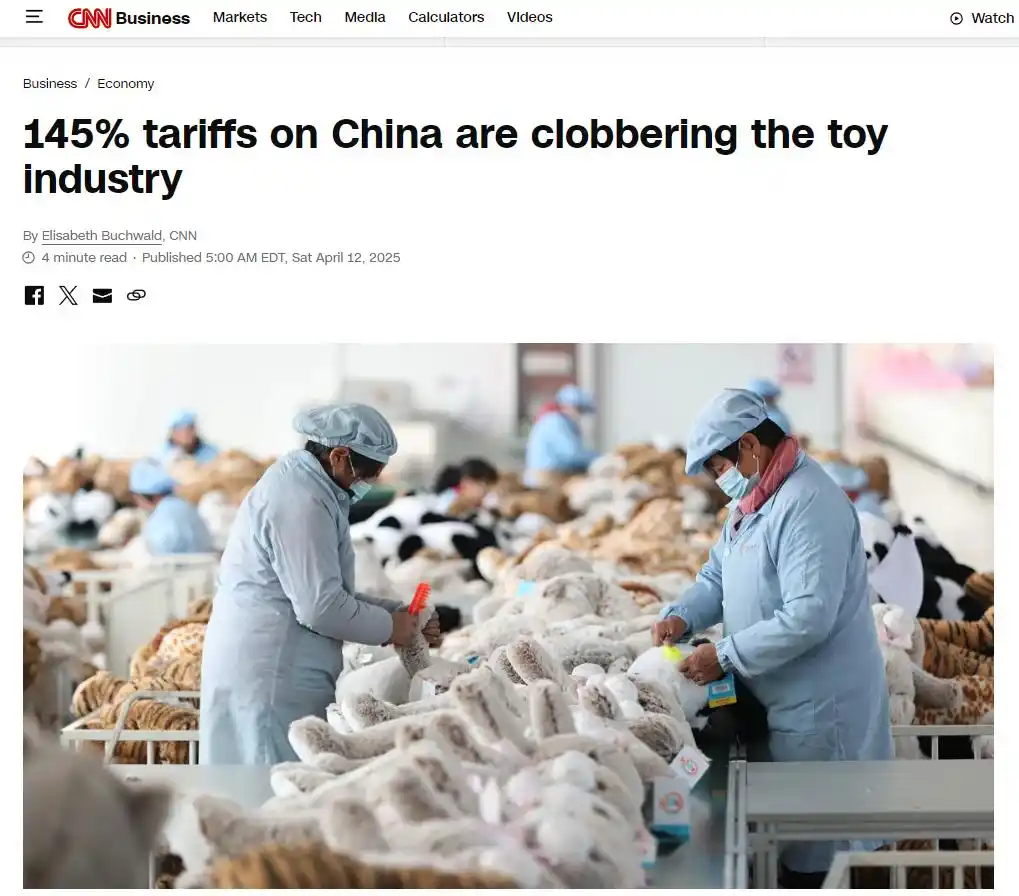Dolls and toys made in China bring joy to children around the world. However, when dolls go up in price and toys go out of stock, what else can American children play with?
CNN recently published an article saying that with President Trump once again increased tariffs on China, the U.S. toy industry is facing an unprecedented blow.

‘For American families, this means that toys that were once affordable are becoming luxury items.’ Nearly 80 per cent of toys on the US market are produced in China, the article said, citing figures from the Toy Association of America.
‘We have no choice but to raise our prices by tens of percentage points,’ said Isaac Larian, chief executive of California-based MGA Entertainment. His company produces a number of best-selling U.S. toys including the Bratz line of dolls and the L.O.L. Surprise! line of dolls. ‘The business I've worked so hard to run for 46 years is in jeopardy.’
"What can I do? Should I sell bald dolls?"
Trump has said one of the main motivations for the tariff increases is to bring manufacturing jobs back to the United States. However, Larian noted that the tariff hikes will force him to lay off employees, especially at his Hudson, Ohio, plant, which employs about 700 people and produces many goods that are sold to China.
‘Most of the company's production is done in China, but the Ohio plant primarily produces Little Tikes-branded products, including small cars and sandbox toys.’
Little Tikes' classic Cozy Coupe minivan is one of MGA Entertainment's most popular products.Larian added that while the plant has the capacity to expand production, ‘Americans don't want to work at the plant.’
Even if enough workers could be found, it would still cost more to manufacture toys in the U.S. that were originally made in China, even with existing tariffs.
He also noted that it would be especially difficult to find the raw materials to make doll hair on U.S. soil. "There is not a single factory in the entire United States that makes doll hair. What can I do? Sell bald dolls?" Larian said.
'No choice': China still dominates toy manufacturing
The CNN article notes that while some industries have moved their supply chains out of China, the most significant source of U.S. toy imports continues to be China. According to the U.S. Department of Commerce, U.S. toy imports last year totalled nearly $17.7 billion, of which about 75%, or $13.4 billion, came from China.
Greg Ahearn, president and CEO of the Toy Association of America, said, ‘This goes back to the 1980s and 1990s, when companies were looking for lower-cost manufacturing bases around the world.’
Labour costs in China are lower than in many other parts of the world, Ahearn said, helping to reduce the cost of toy manufacturing, which in turn benefits consumers with lower prices. Even though technology has advanced in recent years, toy production still requires a lot of handwork, such as colouring the faces of dolls or action figures.

The majority of toys sold in the U.S. market are made in China, according to Toys for America data. With Trump imposing tariffs of up to 145 per cent on Chinese goods, the price of these toys could rise significantly.
In addition, many toy manufacturers are themselves small businesses. It would be easier for them to take advantage of China's existing industrial infrastructure than to build a factory in the U.S. from scratch, Ahern said.
"There is no alternative in the short term. The U.S. has some manufacturing capacity, but it's focused on those areas that can be highly automated," Ahern added. He also served as chief marketing officer for Toys R Us.
Jay Foreman, chief executive of Basic Fun! a toy company that makes products such as Care Bears and Tonka trucks, said in a February interview that the company's entire supply chain is in China.
‘How can we just pull out our moulds, our factory base, our production process ...... and move to another country?’ Foreman said, ‘There are some things that simply can't be done in the U.S. Toys are one of them.’
After the 145% tariff policy, Foreman was interviewed again and confessed, "The situation ...... has evolved from a “problem” to a Basic Fun! and even a whole industry ' crisis'. This not only threatens the price and supply of toys, but may even destroy the survival of the entire industry's foundation."
This situation, too, is exactly what many toy companies are facing, especially at a time when they should be placing orders for the holiday selling season. Ahern said that some companies ‘may have trouble maintaining operations’ due to plummeting revenues.
Basic Fun! has now suspended all toy shipments, putting it in a potentially serious crisis. Foreman said, ‘We can't take the risk because we have no idea what the applicable tariffs will be when the shipments arrive.’
But at the same time, ‘If we don't have the product, we don't have the cash flow, and that means we can't even pay our bills.’
Editor: Zhao Chenyan
Source: cnn.com
Source: chinadaily.com.cn